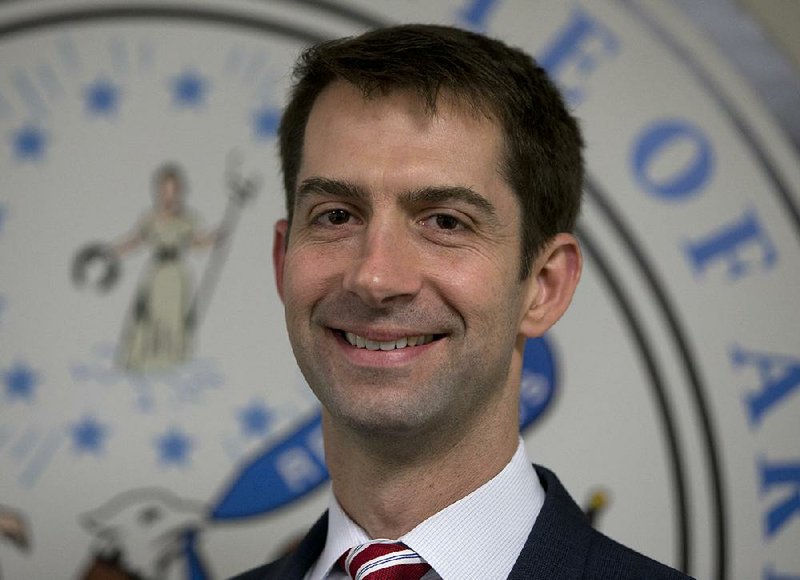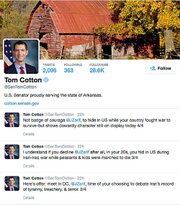WASHINGTON -- U.S. Sen. Tom Cotton drew attention Thursday after he again sparred with Iran's foreign minister on Twitter, calling the minister "cowardly" for not participating in Iran's war with Iraq in the 1980s.
Hey @JZarif, I hear you called me out today. If you’re so confident, let’s debate the Constitution. 1/4
— Tom Cotton (@SenTomCotton) April 29, 2015Here’s offer: meet in DC, @JZarif, time of your choosing to debate Iran’s record of tyranny, treachery, & terror. 2/4
— Tom Cotton (@SenTomCotton) April 29, 2015I understand if you decline @JZarif after all, in your 20s, you hid in US during Iran-Iraq war while peasants & kids were marched to die 3/4
— Tom Cotton (@SenTomCotton) April 29, 2015Not badge of courage @JZarif, to hide in US while your country fought war to survive-but shows cowardly character still on display today 4/4
— Tom Cotton (@SenTomCotton) April 29, 2015Serious diplomacy, not macho personal smear, is what we need. Congrats on Ur new born. May U and Ur family enjoy him in peace .@SenTomCotton
— Javad Zarif (@JZarif) April 30, 2015The Iranian leader fired back, calling the Dardanelle Republican's comments a "macho personal smear."
Cotton and Mohammad Javad Zarif have corresponded repeatedly and publicly on Twitter in the weeks since Cotton wrote an open letter to leaders of the Islamic Republic noting that without congressional approval, any nuclear-arms deal agreed to by President Barack Obama and Iran can be revoked when Obama leaves office in 2017. Nearly every Republican in the U.S. Senate signed the letter.
The United States, Iran and five other countries negotiating the nuclear deal have given themselves until the end of June to reach a final agreement on international oversight of the Middle Eastern country's nuclear program and on lifting sanctions that have crippled the Iranian economy for decades.
The two-day back and forth began after Zarif mentioned Cotton in a speech Wednesday at New York University.
Zarif said United Nations sanctions on Iran would be lifted if a deal is reached, "whether Sen. Cotton likes it or not." He also said that the U.S. is bound by international law to follow an agreement that the executive branch signs, even if the legislative branch objects, saying, "You know that, maybe Sen. Cotton doesn't, but you know that 90 percent of U.S. overseas agreements are executive agreements."
"I've studied and lived in the U.S., I know enough about the U.S. Constitution and U.S. procedures. But as a foreign government, I only deal with the U.S. government. I do not deal with the U.S. Congress. I do not deal with the U.S. Supreme Court," Zarif said.
Cotton, who has a law degree from Harvard University, has said Zarif doesn't understand the U.S. Constitution. Zarif, who has a doctorate in international law and politics from the University of Denver, has said Cotton doesn't understand international law and relations.
In a series of Twitter messages sent within a span of four minutes Wednesday afternoon, Cotton challenged Zarif, known on Twitter by the name @JZarif, to a debate about the Constitution and criticized the foreign minister for being in the United States during the 1980s war between Iran and Iraq.
"Hey @JZarif, I hear you called me out today. If you're so confident, let's debate the Constitution," the first message said. "Here's offer: meet in DC, @JZarif, time of your choosing to debate Iran's record of tyranny, treachery, & terror," the second said.
"I understand if you decline @JZarif after all, in your 20s, you hid in US during Iran-Iraq war while peasants & kids were marched to die," Cotton, a former Army captain who served in Iraq and Afghanistan, said in a third message.
"Not badge of courage @JZarif, to hide in US while your country fought war to survive-but shows cowardly character still on display today," Cotton's final message said.
During the Iran-Iraq war in the 1980s, Zarif was earning several international relations degrees at American schools. He also served as a member of the Iranian delegation to the United Nations for most of the decade. The eight-year war killed at least half a million people. The United States tacitly supported Iraq in the conflict, according to the Encyclopedia Britannica.
On Thursday morning, Zarif responded, saying, "Serious diplomacy, not macho personal smear, is what we need. Congrats on Ur new born. May U and Ur family enjoy him in peace .@SenTomCotton."
Cotton's previous Twitter posts had announced Monday the birth of his son Gabriel and included a photo.
Cotton spokesman Caroline Rabbitt said Cotton wrote and sent the messages to Zarif.
"Mr. Zarif had called Tom out personally earlier in the day in comments he made in [New York City]. His tweets were sparked by those comments," she said.
National and international media outlets picked up the exchange between Cotton and Zarif on Thursday. The Daily Caller called the exchange a "slapfight." National Journal called it a "spat." Australian publication The Sydney (Australia) Morning Herald said it was a "face off," and Cotton "upped the ante with a jab at the Iranian."
University of Arkansas at Fayetteville journalism professor Hoyt Purvis, who is the director of the Fulbright Institute of International Relations, said the back and forth is a sign of how social media has changed diplomacy.
"Technology and social media have sort of accelerated things and that obviously can be significant," Purvis said. "Diplomacy as we once knew it was sort of a very deliberate process, but that's no longer the case."
He said social media has made it easier for those outside the direct diplomatic arena to insert themselves.
"There is ample precedent for members of Congress to speak out, but the channels that are open today are quite different than they were in the past," he said. "This is a different world."
Purvis said former U.S. Sen. J. William Fulbright, D-Ark., and the Senate Foreign Relations Committee took a hard stance against policies on Vietnam during the administrations of Lyndon Johnson and Richard Nixon, but did so in committee meetings.
"But, that was mostly done through hearings, congressional hearings, and not through back-and-forth comment with leaders of foreign governments," he said.
Members of Congress have said they are worried that the Iran deal being negotiated is too lenient, and the U.S. Senate is debating legislation that would give Congress a say in the final agreement. That legislation potentially stalled Thursday, when Cotton and U.S. Sen. Marco Rubio, R-Fla., moved to force a vote on contentious amendments that Iran is unlikely to agree to, such as requiring that Iran recognize Israel's statehood as a condition of any nuclear deal.
On the Senate floor, Cotton criticized colleagues who have blocked votes on similar amendments during the days of debate.
"It's fine if you want to vote no. But we need to vote. If you don't want to vote, you shouldn't have come to the Senate. If you're in the Senate, and you don't want to vote, you should leave," he said.
To advance to a final vote, Senate Majority Leader Mitch McConnell, R-Ky., would have to restrict what amendments could be added, something he criticized Democrats for when they controlled the chamber.

